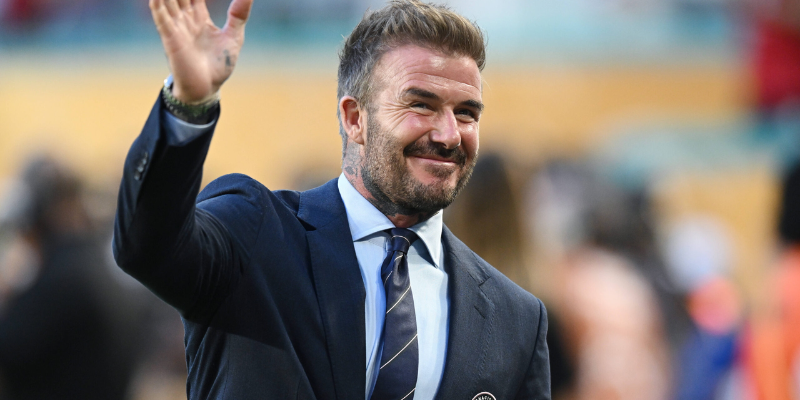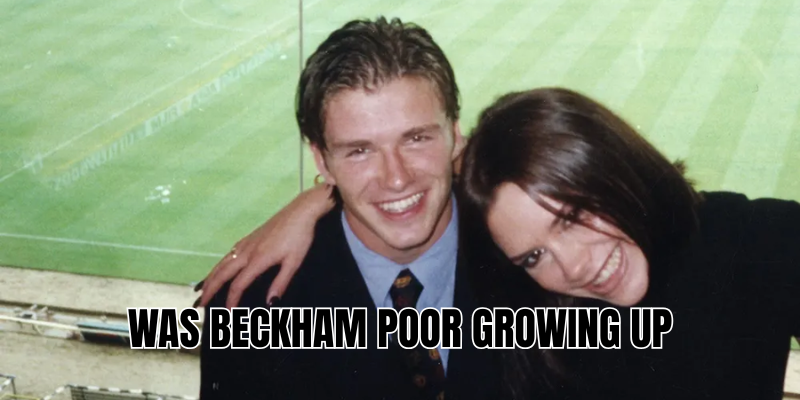David Beckham’s life now sparkles with glamour: stadiums, endorsements, a global brand, fame that reaches far beyond the pitch. But behind every highlight reel lies a story that begins in East London, in a modest house with hopes bigger than bank accounts. Was Beckham poor growing up? In this article, QuraGoal will walk you through the realities of his childhood, debunk myths, and show how a working-class boy became “Golden Balls.”
Beckham’s Family Roots and Early Life

David Robert Joseph Beckham was born on 2 May 1975 in Leytonstone, East London. His father, Ted Beckham, worked as a kitchen fitter, and his mother, Sandra (née West), was a hairdresser. His parents held down blue-collar jobs and raised three children—Lynne, David, and Joanne—with limited means but great aspirations.
That parental background is key: although not destitute, the Beckhams were solidly working class. Their income was enough to get by, but not to spare luxuries. In interviews and documentaries later in life, David often describes his upbringing as “humble” and “modest.” A Netflix series exploring his life explicitly mentions his “humble working-class beginnings.”
David didn’t grow up in dire poverty—he wasn’t scavenging for meals or sleeping rough—but he lacked the safety nets and privileges many wealthier peers take for granted. In many respects, his childhood fits the definition of a working-class youth with limited economic resources but strong familial support.
What “Poor” Means: Poverty vs Working-Class
To answer was Beckham poor growing up, it’s essential to distinguish absolute poverty from relative financial hardship.
- Absolute poverty means lacking access to basic needs—food, shelter, healthcare. There’s no strong evidence that Beckham’s family reached that extreme.
- Relative hardship, however, means living with fewer resources compared to peers, being unable to afford extras, or feeling the financial squeeze. In that sense, Beckham’s family experienced constraints typical of working-class households.
Beckham himself, in interviews, sometimes frames his youth in competing language: not destitute, but not affluent either. His life displays some markers of economic constraint, not deprivation.
Indicators from His Youth: Struggles and Sacrifices

The following anecdotes help illustrate the financial environment Beckham grew up in—enough to show limitation, not destitution:
- He played local youth football for Ridgeway Rovers. His father coached and supported him, which means a family effort rather than institutional backing.
- He took part in youth programs like Bobby Charlton’s soccer school and trialed with Tottenham and Leyton Orient. These steps show he sought opportunity often by self-investment, not because a wealthy backer pushed him forward.
- In his autobiography, he describes being small in stature and overlooked by the England Schoolboys’ selectors. Financial backing might have helped with better coaching or nutrition, but he had to fight through comparative disadvantage.
- During a public moment in a documentary, David confronts Victoria Beckham’s claims about her “very working-class” upbringing. He challenges her to be honest, highlighting the difference between his background and hers. In that confrontation, he implies his family did not have the luxuries that might come with middle class status.
These stories suggest a boy who had to make measured choices, who could not lean on financial privilege, and whose path to success was paved in grit and resourcefulness.
Comparative Lens: Beckham vs Others
When readers ask was Beckham poor growing up, they often compare him to other famous athletes with humble beginnings—Michael Owen, Steven Gerrard, Marcus Rashford. Beckham fits more into that mold: modest origins, then exceptional pro drive.
Compared to famous stars born into relatively well-off or middle-class households, Beckham’s story has that “from the bottom” narrative. But compared to players who actually grew up in extreme poverty, street life, or slums, Beckham’s childhood was more stable, though not comfortably cushioned.
The Role of Opportunity, Sacrifice, and Support

Even in modest financial conditions, a few elements changed Beckham’s trajectory:
- Supportive parents: Despite limited means, his parents supported his football dreams—buying kits, helping with travel, and encouraging trials.
- Persistence and talent: Beckham’s reputation for work rate, discipline, and technical growth helped him attract attention beyond his local sphere.
- Chance and infrastructure: He got chances at Tottenham’s school or trials in youth setups that many in his shoes never access.
These ingredients—talent + parental sacrifice + opportunity—allow stories like Beckham’s to emerge. But none of them erase the fact that his upbringing lacked the advantages many peers enjoyed.
Myths and Misconceptions
- “He was poor like in documentaries showing destitution.”
- No credible evidence suggests the Beckham family lived in extreme poverty—no reports of lacking food or shelter.
- “Because he’s now wealthy, he must have exaggerated hardship.”
- Success doesn’t discredit genuine early struggles. Many stars amplify humble roots as part of their narrative—but in Beckham’s case, numerous independent accounts align with the working-class claim.
- “Footballers.”
- Everyone’s journey is different. Beckham’s path had constraints; others’ had different constraints. Comparison is nuanced.
Final Thoughts
In first instance: was Beckham poor growing up? The simplest answer is: no, he was not poor in the extreme sense—but yes, he came, working-class origins and experienced real financial constraints and challenges. His past shaped his mindset, his work ethic, and perhaps some of that fire that made him a world icon.
Today, QuraGoal invites you: if you enjoyed discovering Beckham’s roots, explore more of our deep dives into footballing legends’ origins—how they got, leave your thoughts below—do you think humble beginnings always fuel greatness?




